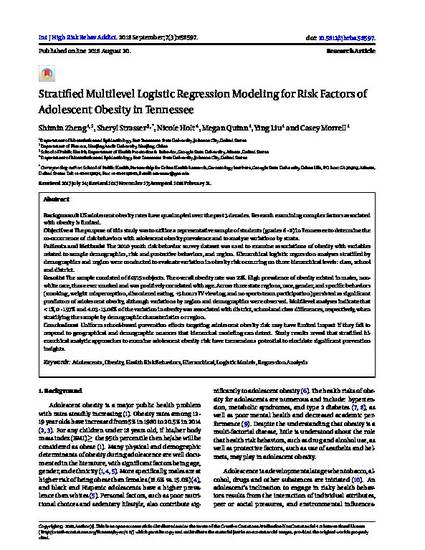
Background: US adolescent obesity rates have quadrupled over the past 3 decades. Research examining complex factors associatedwith obesity is limited.Objectives: The purpose of this study was to utilize a representative sample of students (grades 6 - 8) in Tennessee to determine theco-occurrence of risk behaviors with adolescent obesity prevalence and to analyze variations by strata. Methods: The 2010 youth risk behavior survey dataset was used to examine associations of obesity with variables related to sampledemographics, risk and protective behaviors, and region. Hierarchical logistic regression analyses stratified by demographics andregion were conducted to evaluate variation in obesity risk occurring on three hierarchical levels: class, school and district. Results: The sample consisted of 60715 subjects. The overall obesity rate was 22%. High prevalence of obesity existed in males, non-white race, those ever smoked and was positively correlated with age. Across three state regions, race, gender, and specific behaviors (smoking, weight misperception, disordered eating, +3 hours TV viewing, and no sports team participation) persisted as significantpredictors of adolescent obesity, although variations by region and demographics were observed. Multilevel analyses indicate that< 1%, 0 - 1.97% and4.03 - 13.06% of the variation in obesity was associated with district, school and class differences, respectively, whenstratifying the sample by demographic characteristics or region. Conclusions: Uniform school-based prevention efforts targeting adolescent obesity risk may have limited impact if they fail torespond to geographical and demographic nuances that hierarchal modeling can detect. Study results reveal that stratified hi-erarchical analytic approaches to examine adolescent obesity risk have tremendous potential to elucidate significant prevention insights.
Available at: http://works.bepress.com/shimin-zheng/114/

Copyright © 2018, Author(s). This document was originally published in International Journal of High Risk Behavior Addiction.